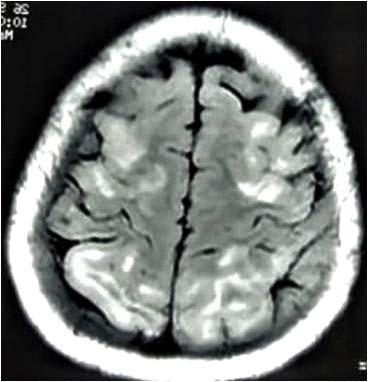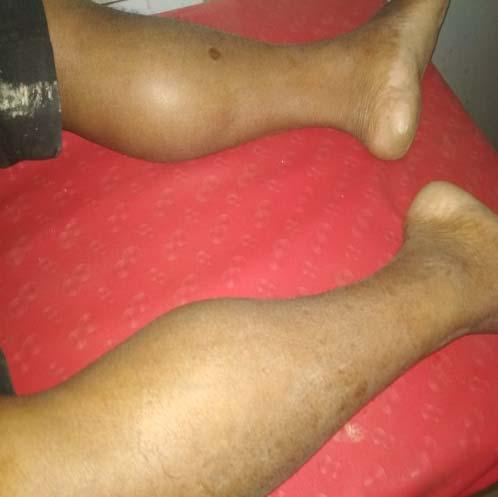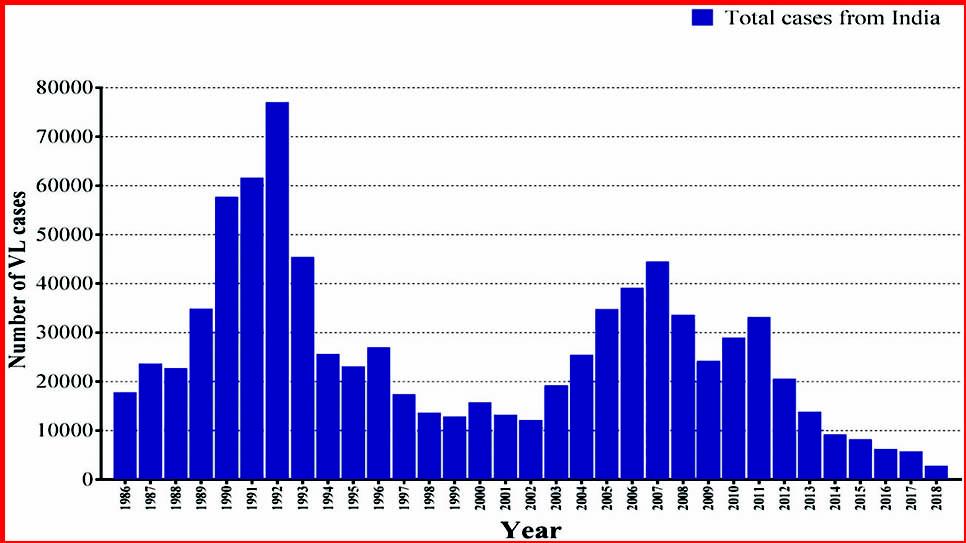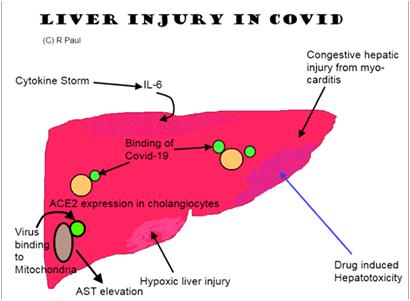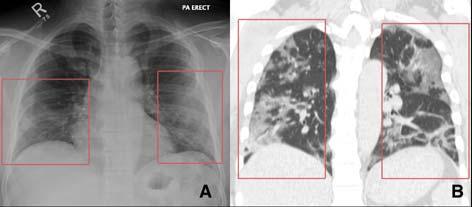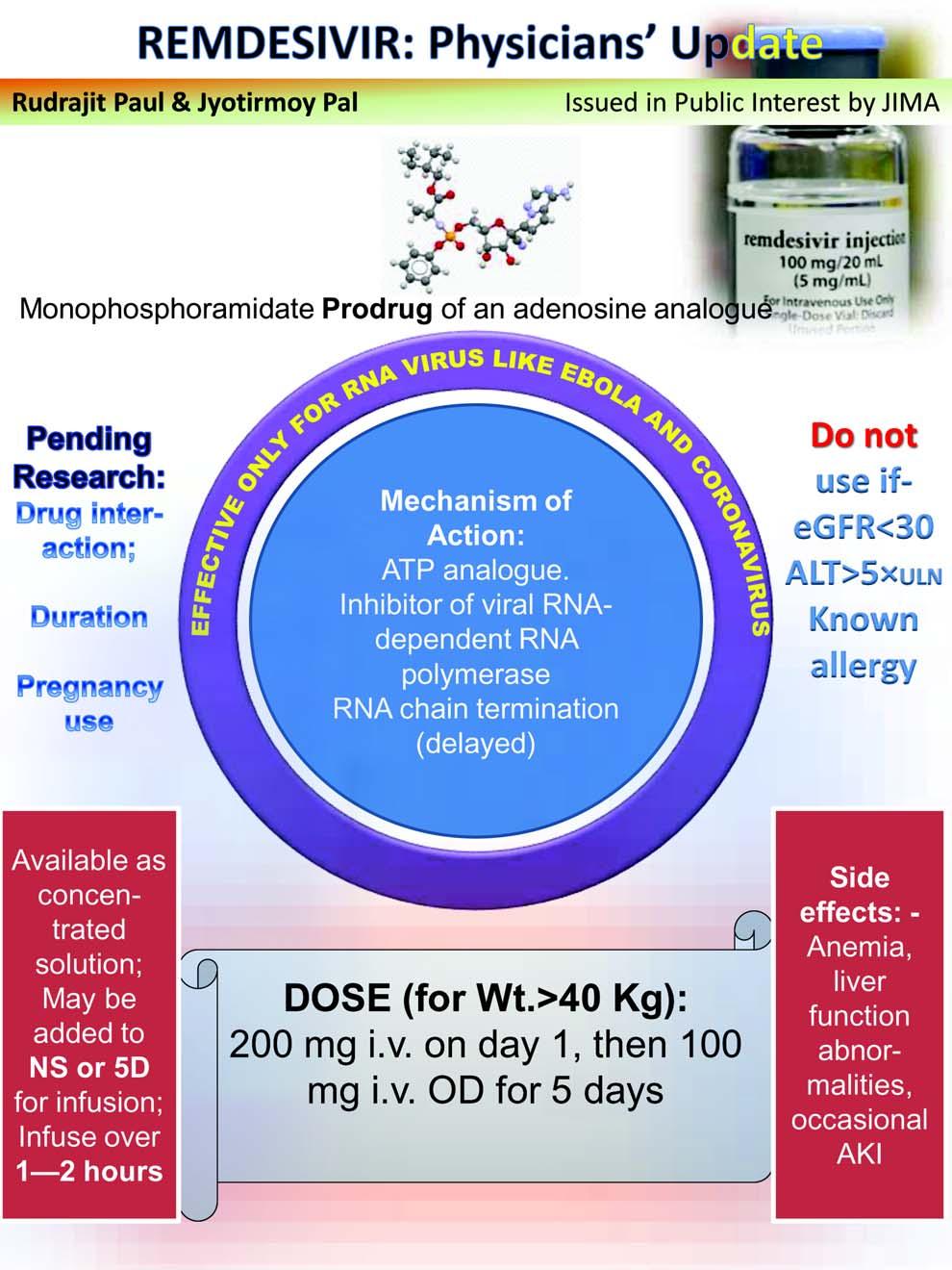
8 minute read
Santanu K Tripathi
JOURNAL OF THE INDIAN MEDICAL ASSOCIATION, VOL 118, NO 06, JUNE 2020
Drug Corner Remdesivir in Covid-19 Therapeutics — An Interim Status Report
Advertisement
Shambo Samrat Samajdar 1 , Santanu K Tripathi 2
Remdesivir currently is the only recognized specific therapy, though with emergency use authorization (EUA), in Covid-19. The Ministry of Health &Family Welfare, Government of India has included it as a possible 'newer therapy' as Compassionate Emergency use under Named Patient Basis on June 13, 2020 and is being perceived as a ray of hope in Moderate to Severe Covid-19 cases.
[J Indian Med Assoc 2020; 118(6): 79-81]
Key words : EUA, newer therapy, Compassionate.
As the Covid-19 pandemic has caught the whole world unawares and clueless with no specific therapy and vaccine to contain this menace, remdesivir (RDV) appears as a ray of hope. RDV is a prodrug. It’s nucleotide analogue inhibits viral RNA polymerases, sterically interacting with the viral RNA dependent RNA polymerase (RdRp) and inducing delayed chain termination. A few in vitro studies demonstrated it’s effect against multiple coronaviruses eg, severe acute respiratory syndrome coronavirus (SARS-COV), Middle East respiratory syndrome coronavirus (MERS), SARS-COV-2 and bat coronavirus 1 . In another in vitro study RDV showed to unsettle pan-CoV RdRp function by inhibiting viral replication of SARS, MERS, and the model â coronavirus murine hepatitis virus (MHV) 2 . As on date, this drug is the only recognized specific therapy, albeit with emergency use authorization (EUA), in Covid-19 and thus is much sought after in different parts of world for treatment of severe infections. In this brief commentary, we make an attempt to evaluate the current position of RDV in Covid-19 therapeutics.
On May 1, 2020, the US-FDA issued EUA of RDV to allow emergency use in severe COVID-19 infection in hospitalized adults and children 3,4 . Earlier clinical trials of RDV in Ebola virus infections showed only limited benefit 5 . Studies in animal models had demonstrated antiviral efficacy of RDV in SARS-CoV and MERS-CoV 6 . In an in vitro study for MERS-CoV with RDV plus interferon beta (IFNb) was demonstrated
1 DM Resident in Clinical Pharmacology, School of Tropical Medicine, Kolkata 700073 2 Professor & Head, Department of Clinical & Experimental Pharmacology, School of Tropical Medicine, Kolkata 700073
Received on : 16/06/2020 Accepted on : 19/06/2020 Editor's Comment :
RDV is an antiviral drug with potential beneficial
effects in Covid-19. But it is still investigational and not an approved drug yet. We need more convincing data on efficacy and safety. A number of randomized controlled trials are ongoing. With evolving evidences and knowledge the status of RDV in treating Covid19 obviously ought to change.
Currently, RDV is allowed in certain countries
including USA and India, for use under EUA in treating hospitalized Covid-19 patients requiring invasive interventions like oxygenation, ventilation. The availability and access of these therapies are limited and controlled.
The status is fast evolving. The readers are advised
to keep updated on the changing status of RDV.
that the antiviral activity is superior in comparison with lopinavir/ritonavir 10 .
Currently, several phase 3 clinical trials are testing RDV with varying treatment regimens for moderate and severe COVID-19, compared with standard of care, in the United States, South Korea, and China. Of particular interest is one adaptive randomized placebocontrolled trial – the Adaptive COVID-19 Treatment Trial (ACTT), coordinated by the National Institute of Health (NCT04280705), that started first with a comparator placebo arm, but with provision of adding other potential therapies, as the evidence emerges. The first experience with this study involved passengers of the Diamond Princess Cruise ship in quarantine at the University of Nebraska Medical Center in February 2020 after returning to the United States from Japan following an on-board outbreak of COVID-19 7 .
On April 29, 2020 FDA announced the EUA for RDV based on preliminary data analysis of the ACTT study. The analysis included 1,063 hospitalized advanced COVID-19 patients who had lung involvement. Patients who received RDV had recovered faster than similar
79
JOURNAL OF THE INDIAN MEDICAL ASSOCIATION, VOL 118, NO 06, JUNE 2020
patients who received placebo. Preliminary results showed that patients who received RDV had a 31% faster time to recovery than those who received placebo (P< 0.001). The median time to recovery was 11 days in patients treated with RDV compared with 15 days in those who received placebo. Survival benefit was shown with a mortality rate of 8% in the RDV group, compared with 11.6% in the placebo group, but this was not statistically significant (P = 0.059) 8 .
The open-label phase 3 SIMPLE trial (n = 397) in hospitalized severe COVID-19 patients showed similar improvement in clinical status with the 5-day RDV regimen compared with the 10-day regimen on day 14 (OR: 0.75 [95% CI 0.51-1.12]). Time to clinical improvement for 50% of patients was 10 days in the 5- day treatment group and 11 days in the 10-day treatment group. This study emphasized the potential for some patients to be treated with a 5-day regimen 9 .
The US FDA issued an EUA regarding emergency use of the unapproved product RDV for treatment of suspected or laboratory confirmed coronavirus disease 2019 (COVID-19) in adults and children hospitalized with severe disease.
Against this backdrop, on June 2, 2020, the Drug Controller General of India (DCGI) has given the approval to RDV for “restricted emergency use” on severely ill hospitalised coronavirus patients. Gilead, the innovator of the drug, received conditional approval from DCGI under the accelerated review process. It was granted a waiver to conduct clinical trials in India. However, Gilead, instead of marketing RDV themselves in India, preferred to have a licensing arrangement with some domestic Indian companies. Thus, as on date, six Indian companies eg, Hetero, Cipla, BDR Pharmaceuticals, Jubilant Life Sciences, Mylan and Dr. Reddy’s Labs, have applied to the CDSCO, the Indian drug regulator for marketing authorization of RDV. All of these companies barring BDR have licensing agreement with Gilead. The CDSCO has been actively considering these applications towards granting permission to manufacture and market Gilead’s RDV in India “on priority” and in accordance with the “laid down procedures”.
On the June 13, 2020 the Directorate General of Health Services (EMR Division), Ministry of Health and Family Welfare, Government of India (GoI), issued its revised (version 3) ‘Clinical Management Protocol: Covid-19’ that included a few newer therapies in COVID 19 patient management 11 , eg, RDV, convalescent plasma and tocilizumab, but with a note of admission that usage of these therapies have a limited available evidence. The protocol advocates using RDV in COVID 80 patients with moderate disease (those on oxygen) under ‘Emergency Use Authorization’. RDV should not be used if AST/ALT > 5 times upper limit of normal (ULN) and in patients with severe renal impairment (ie, eGFR < 30ml/min/m2 or need for hemodialysis). It is also contraindicated in pregnancy or lactating females and children (<12 years of age). The recommended dose is 200 mg IV on day 1 followed by 100 mg IV daily for 5 days. During therapy with this ‘investigational’ drug, the physicians should put some extra effort in monitoring its safety. Particular vigilance on possible infusion-related reactions like hypotension, nausea, vomiting, diaphoresis, and shivering, is solicited. Besides, caution should be exercised regarding it’s potential for causing hepatic injury –transaminase values need to be monitored. Reporting of all suspected adverse drug reactions (ADR) to the national programme – Pharmacovigilance Programme of India (PvPI) in the prescribed reporting form, remains an obligation of the physician. The ADR reporting can be accessed at the CDSCO website (cdsco.gov.in).
He treating physician should inform the patient/ caregiver prior to treatment initiation that RDV is an unapproved drug that currently has an EUA only. Information should be delivered prior to the patient receiving RDV.
RDV is yet to be approved for general use in India. Currently it is only the ‘Compassionate Emergency Use under Named Patient Basis’ that is allowed by GoI. Once the applications of the Indian companies are granted by the CDSCO, the treating physician and the hospital need to avail the supplies from any of these companies who may be in a position to make the supply. However, a prior approval by the DCGI would be needed for each such named patient use. The physician/ hospital administration has to write to the DCGI (see the format provided below) seeking approval for compassionate emergency use for the named patient, with a copy to the specific Indian company. It may take 3-4 days for delivery of the medicine 13 . In case the medicine is not utilized for that particular patient, it needs to be returned to the company.
Funding : No funding.
REFERENCES:
1 Sheahan TP, et al — Broad-spectrum antiviral GS-5734 inhibits both epidemic and zoonotic coronaviruses. Sci. Transl. Med. 2017, 9 (396), eaal3653.10.1126/scitranslmed.aal3653. 2 Green N, Ott R D, Isaacs R J, Fang H — Cell-based Assays to
Identify Inhibitors of Viral Disease. Expert Opin Drug Discov. 2008;3(6):671-676. doi:10.1517/17460441.3.6.671 3 FDA. Coronavirus (COVID-19) Update: FDA Issues
Conflict of interest : None.
JOURNAL OF THE INDIAN MEDICAL ASSOCIATION, VOL 118, NO 06, JUNE 2020
Emergency Use Authorization for Potential COVID-19
Treatment. fda.gov. Available at https://www.fda.gov/newsevents/press-announcements/coronavirus-covid-19-updatefda-issues-emergency-use-authorization-potential-covid-19- treatment. May 1, 2020; Accessed: May 1, 2020. 4 FDA. FACT SHEET FOR HEALTH CARE PROVIDERS
EMERGENCY USE AUTHORIZATION (EUA) OF RDV (GS5734™). fda.gov. Available at https://www.fda.gov/media/ 137566/download. May 1, 2020; Accessed: May 1, 2020. 5 Mulangu S, Dodd LE, Davey RT Jr, Tshiani Mbaya O, Proschan
M, and the PALM Consortium Study Team, et al. A Randomized,
Controlled Trial of Ebola Virus Disease Therapeutics. N Engl
J Med 2019; Dec 12. 381 (24):2293-2303. 6 Martinez MA — Compounds with therapeutic potential against novel respiratory 2019 coronavirus. Antimicrob Agents
Chemother. 2020 Mar 9. 7 Sheahan TP, Sims AC, Leist SR, Schäfer A, Won J, Brown
AJ, et al — Comparative therapeutic efficacy of RDV and combination lopinavir, ritonavir, and interferon beta against
MERS-CoV. Nat Commun. 2020 Jan 10. 11 (1):222. 8 National Institutes of Health — NIH clinical trial of RDV to treat
COVID-19 begins. Department of Health and Human Services.
Available at https://www.nih.gov/news-events/newsreleases/nih-clinical-trial-RDV-treat-covid-19-begins. 2020
Feb 25; Accessed: March 24, 2020. 9 NIH Clinical Trial Shows RDV Accelerates Recovery from
Advanced COVID-19. National Institute of Allergy and
Infectious Diseases (NIAID). 2020 Apr 29. Available at https:/ /www.niaid.nih.gov/news-events/nih-clinical-trial-shows
RDV-accelerates-recovery-advanced-covid-19. 10 Gilead Announces Results From Phase 3 Trial of
Investigational Antiviral RDV in Patients With Severe COVID19. Gilead. 2020 Apr 29. Available at https://www.gilead.com/ news-and-press/press-room/press-releases/2020/4/gileadannounces-results-from-phase-3-trial-of-investigationalantiviral-RDV-in-patients-with-severe-covid-19. 11 CLINICAL MANAGEMENT PROTOCOL: COVID-19
Government of India Ministry of Health and Family Welfare
Directorate General of Health Services (EMR Division) Version 3 13.06.20. 12 Website of Gilead Pharma: www.gilead.com.
81


